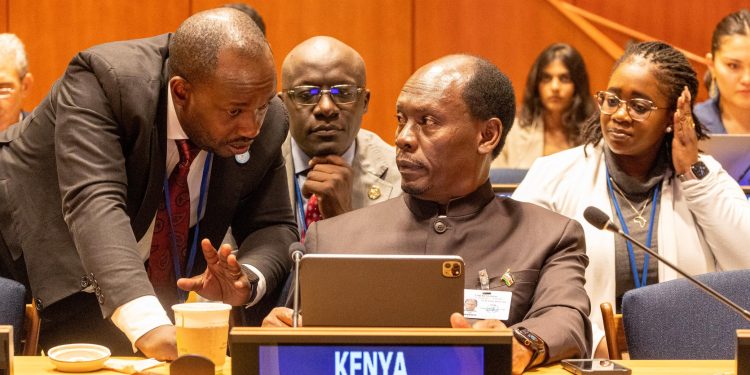The Future of AI Belongs to Africa; Are African Countries Getting It Right?

Over the recent past, the Artificial Intelligence (AI) wave has touched almost every corner of the globe. Its capacity has also expanded, enabling it to perform increasingly complex tasks in almost every field, and advancing so rapidly that no sector, region, or economy should be left behind.
Countries around the world are at various stages of development in terms of their adaptability to and utilization of AI to support their socioeconomic activities. The United States of America (USA) and the People’s Republic of China (PRC) are currently leading in the development and utilization of AI innovations, closely followed by Europe and certain parts of Asia.
A recent view has emerged that an AI cold war is pitting the United States of America and the People’s Republic of China, according to Wayan Vota, a moderator and regular commentator on the ICTworks blog. Both countries are seemingly drawing the low- and middle-income countries to adopt their AI technological initiatives and systems.
Artificial Intelligence in Africa
Meanwhile, in Africa, the adoption of Artificial Intelligence is spreading, albeit at a slower rate compared to America, Europe, and certain parts of Asia.
Currently, African countries are in the process of establishing their national AI policies and/or strategies, indicating that they are at the initial stages of developing their AI ecosystems.
The African countries’ AI policies and strategies aim to harness AI as a tool for national development and social progress, while also vigilantly guarding against potential misuse or unintended negative consequences.
Thus, governance and control are a major focus of the strategies and must be handled delicately, or they may hinder Africa’s innovation journey in AI.
According to iAfrica, the future of Artificial Intelligence belongs to Africa due to two factors: Africa has the world’s youngest population, with 60% below 25 years; and Africa has the world’s fastest-growing labor force, with a projection that by 2035, more of its citizens will enter the workforce every year than the rest of the world combined.
Concerns about readiness
There are concerns about Africa’s readiness to occupy and lead the global AI space. The potential of having a youthful population and a large emerging workforce can be both a blessing and a curse if not managed effectively.
The education systems in African countries must take the lead in preparing the youth for the global leadership in AI.
Currently, Kenya, Nigeria, South Africa, and Rwanda are at the forefront of this leadership. There is evidence of numerous AI-related initiatives currently underway in these countries.
The leading sectors in innovation and AI adoption in Africa are health, agriculture, and finance.
However, the education sector falls lower down the grid of AI development and use; yet, it ought to be the epicenter where AI innovations are designed, incubated, developed, and utilized to shape the future global workforce.
If African countries want to lead the global future of AI development and use, their education systems must be restructured to make them “fit for purpose”.
Curriculum reforms should reflect a deep dive into educational technology, specifically programming, coding, and robotics.
In addition, the pace of investment in educational infrastructure, curriculum reform, teacher training, teaching and learning resources, as well as modern technologies, has to be accelerated.
iAfrica indicates that African education systems are often outdated, posing a challenge in preparing Africa’s youth for the future labor force.
AI policies in Africa
A review of selected AI policies and strategies in the four African countries points to the vision they have for achieving leadership in Artificial Intelligence development and use.
For example, in Nigeria, the Federal Government has directed the Nigerian Educational Research and Development Council to ensure that robotics and artificial intelligence are integrated into the country’s primary education curriculum.
Rwanda’s national AI policy aims the adapt the country’s curricula to the era of AI, as well as to data and digital technologies, by investing in and creating a teacher corps to support and train young learners in AI and data-related subjects.
South Africa’s national AI policy framework envisages a country with a robust AI talent pool by incorporating AI into the educational curricula from basic education to tertiary levels.
Kenya’s AI strategy aims at building AI-specific education programs to build a skilled workforce through rapid upskilling and reskilling with regard to AI-specific education to ensure Kenya meets the future demands of the AI industry, fostering sustainable growth and innovation.
Therefore, it is apparent that these countries recognize the important role their education systems play in their aspirations for developing and utilizing AI across their economies.
Subsequently, they have implemented policies to ensure requisite resources are allocated to support their movement towards achieving their national vision for AI development, thereby positioning Africa to become a leader in AI, both currently and in the future.
Africa’s youthful population is poised to significantly impact the continent’s socio-economic development if it ensures well-resourced education systems, relevant curricula, highly skilled teachers, and modern, capable digital and energy infrastructure.
Meanwhile, considerable work remains to be done to propel Africa’s leap into the future as a global leader in AI.
The basic building blocks begin with strong education systems, backed by appropriate policies and resources, targeted at realizing a continent whose Artificial Intelligence technological initiatives and systems are sought after around the globe.
About the Authors
Dr. Brown Onguko, Associate Research Scientist, Education & Technology Research focus area lead in the Human Development Theme at the African Population and Research Center
Dr. Lucy A. Wakiaga is an Associate Research Scientist and the lead of the Higher Education Research focus area in the Human Development Theme at the African Population and Health Research Center.





